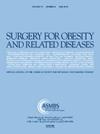Remission of hypertension after laparoscopic sleeve gastrectomy versus Roux-en-Y-gastric bypass: a systematic review of randomized control trials
IF 3.8
3区 医学
Q1 SURGERY
引用次数: 0
Abstract
Background
Besides its benefits for weight loss, current findings suggest that bariatric surgery can induce remission of hypertension. Limited data report the effect of bariatric surgery on this obesity-associated comorbidity.
Objective
Compare the short-term, mid-term, and long-term remission of hypertension after sleeve gastrectomy versus Roux-en-Y gastric bypass.
Setting
Meta-analysis of randomized controlled trials (RCTs).
Methods
Four databases (Embase, PubMed, Scopus, and Science Direct) were searched for RCTs that compared the effects of sleeve gastrectomy (SG) versus Roux-en-Y gastric bypass (RYGB) on hypertension remission at <1 year, 2–4 years, and ≥5 years. Patients with a history of hypertension and who had primary bariatric surgery were included.
Results
After reviewing 11,814 studies, only 11 RCTs were included. In total, the analysis included 2323 patients, with 1158 in the SG group (49.85%) and 1165 in the RYGB group (50.15%). It was found that SG and RYGB procedures had comparable hypertension remission at ≤1 year (Relative risk: 1.11, 95% CI .83–1.48, P = .49), and between 2 and 4 years (Relative risk: 1.11, 95% CI .90–1.37, P = .34). However, there was a significant difference in hypertension remission at ≥ 5 years, favoring RYGB (relative risk: 1.39, 95% CI 1.06–1.82, P = .02).
Conclusion
This systematic review and meta-analysis of RCTs demonstrates that RYGB is superior to SG in resolving hypertension beyond 5 years postoperatively. These findings highlight the long-term benefits of RYGB over SG in managing hypertension, providing valuable insights for surgical decision-making and patient counseling.
腹腔镜袖带胃切除术与 Roux-en-Y 胃旁路术后高血压缓解情况:随机对照试验的系统回顾。
背景:目前的研究结果表明,减肥手术除了能减轻体重外,还能缓解高血压。有关减肥手术对肥胖相关合并症影响的数据有限:比较袖带胃切除术与 Roux-en-Y 胃旁路术后高血压的短期、中期和长期缓解情况:对随机对照试验(RCTs)进行 Meta 分析:方法:在四个数据库(Embase、PubMed、Scopus和Science Direct)中搜索比较袖带胃切除术(SG)与Roux-en-Y胃旁路术(RYGB)对高血压缓解效果的RCT:在对 11,814 项研究进行审查后,仅纳入了 11 项研究性临床试验。分析共纳入 2323 例患者,其中 SG 组 1158 例(49.85%),RYGB 组 1165 例(50.15%)。研究发现,SG 和 RYGB 手术在≤1 年(相对风险:1.11,95% CI .83-1.48,P = .49)和 2 至 4 年(相对风险:1.11,95% CI .90-1.37,P = .34)的高血压缓解率相当。然而,≥5 年的高血压缓解率存在显著差异,RYGB 更受青睐(相对风险:1.39,95% CI 1.06-1.82,P = .02):这项系统回顾和荟萃分析研究表明,RYGB 在术后 5 年后缓解高血压方面优于 SG。这些发现强调了 RYGB 比 SG 在控制高血压方面的长期优势,为手术决策和患者咨询提供了有价值的见解。
本文章由计算机程序翻译,如有差异,请以英文原文为准。
求助全文
约1分钟内获得全文
求助全文
来源期刊
CiteScore
6.70
自引率
12.90%
发文量
570
审稿时长
56 days
期刊介绍:
Surgery for Obesity and Related Diseases (SOARD), The Official Journal of the American Society for Metabolic and Bariatric Surgery (ASMBS) and the Brazilian Society for Bariatric Surgery, is an international journal devoted to the publication of peer-reviewed manuscripts of the highest quality with objective data regarding techniques for the treatment of severe obesity. Articles document the effects of surgically induced weight loss on obesity physiological, psychiatric and social co-morbidities.

 求助内容:
求助内容: 应助结果提醒方式:
应助结果提醒方式:


